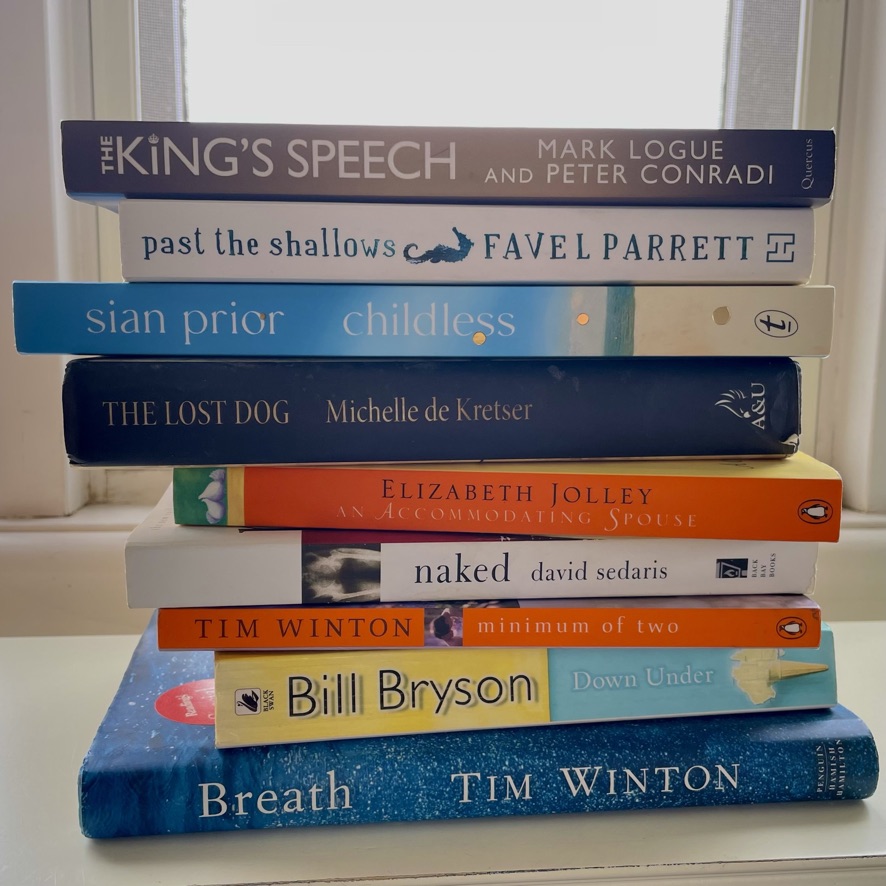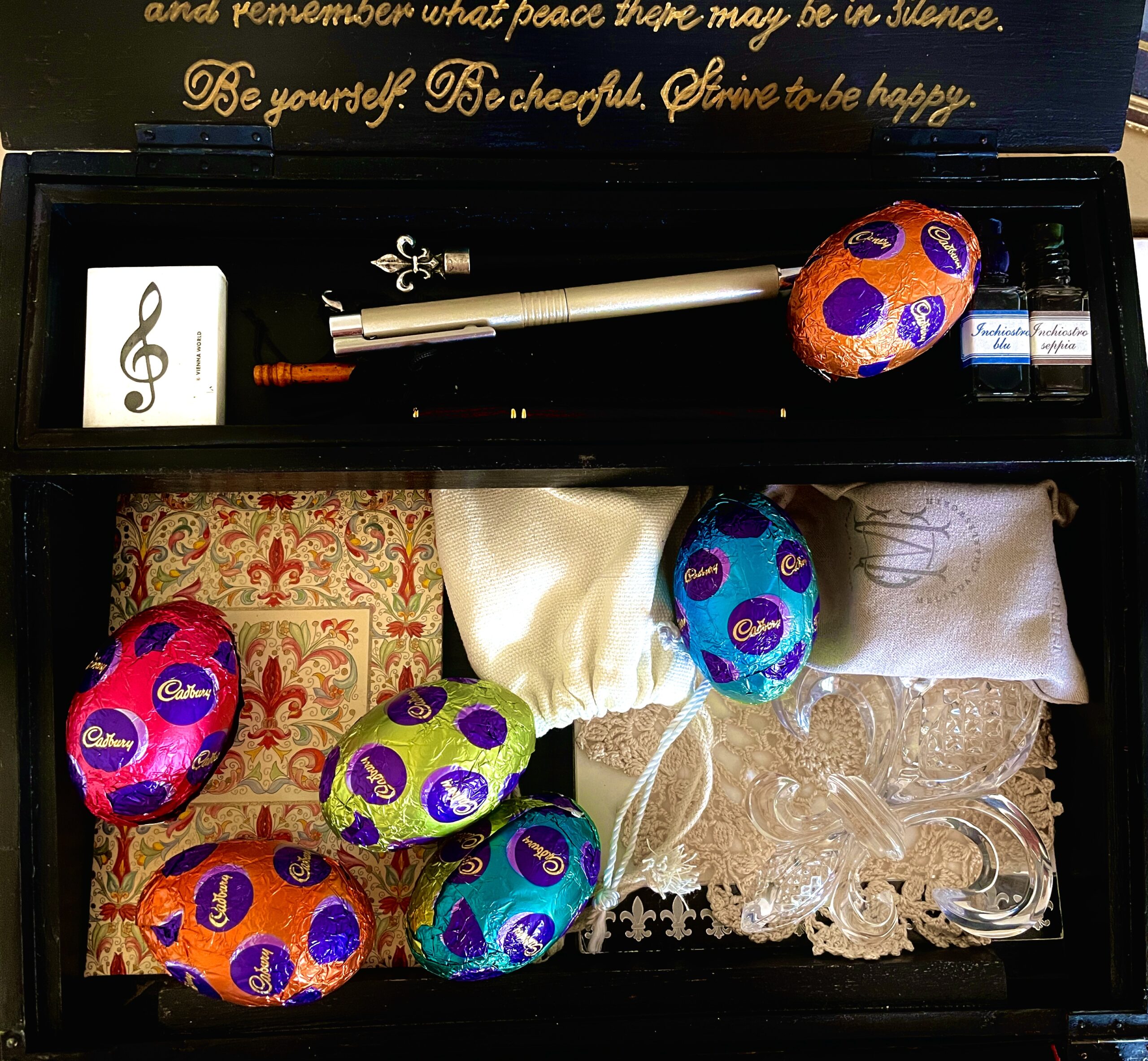This weekend is the biggest on the calendar here in Bendigo. Easter is even more special than usual this year as the new Imperial Dragon (Dai Gum Loong) will write history with his first appearance on the streets in the Easter Sunday festival. And, for the first time, I actually made it to the Book Fair at the YMCA.
The first time! I know, I know, it’s an obvious omission in my self confessed passion for book collecting, but there you go. I have no explanation for it. Be assured that I won’t ever miss it again. It was that good. It was a rainy day on Good Friday and we were desperate to leave the house and the call of all those books was the temptation that got us out the door.
I am so glad I did. We were met by rows and rows of books in beautiful condition, pre-loved but essentially unmarked (note to self – this is unlikely to be the future destination of my collection filled with ex libris stamps) and arranged in categories.
The hall was buzzing, people held precious finds safely in their arms, everyone was polite (you go first, do you mind if I reach over you for that?) and I was like a pig in mud in the most wonderful place I’ve seen since the last time I walked into the library or a bookshop. (OK, it hasn’t been that long after all, you get the picture though). Some browsed up and down every single aisle, others made a beeline to a particular table and began searching with a goal in mind. Me, I headed straight to the fiction tables and joined the line.

I was the somewhat annoying browser who managed to misinterpret the flow of traffic and walk in the wrong direction. People were patient and many smiled at me indulgently. After all, look what I was carrying!
A collection of giants in the world of books, don’t you think?
How happy I was to find them, buy them and give them a future. For this haul of brilliance I paid a whopping sum of… drumroll please, $21.
The Book Sale has been held for the last 50 years by the YWCA. This year it has been handed over to the group at Bendigo Foodshare. I am so happy to be supporting this cause. But there is an awkward question that tickles at my thoughts whenever I buy a second hand book. What about the authors who wrote these beauties?
Writers receive very little of the price you pay when you buy a new book. They won’t receive a cent from my purchase of their work secondhand.
I was shocked to discover that until recently the eBooks and Audiobooks I was borrowing resulted in absolutely no payment to the authors. A casualty of the speed of technology, it seems that copyright law had not kept up with the advent of digital forms of story and the wave of access to electronic versions of our favourite tales actually deprived authors of any benefit from their work at all. News that authors will now be able to claim digital lending rights* is a relief to authors and to me as a reader. I can continue borrowing eBooks in the middle of the night guilt-free knowing a contribution will go to the person who wrote the work that entertains me in the middle of nights when sleep refuses to distract me.
Author incomes in Australia aren’t that great. In fact, they’re a bit shocking. Data from December 2022 indicated that the average annual income of successful, published authors is $18,200. In case you’re still trying to understand what that means, let me clarify. That’s under $20,000, below the poverty line, for the entire year.
I can hear the chorus of questions that start with, ‘are you kidding, why would anyone do that then?’ I am so glad you asked!
Authors write because they, we, love it. We write because we cannot imagine a life without time spent crafting words into story, shaping letters with pen on paper or tapping away squinting at the keyboard of choice. We write because it’s as important to our wellbeing as breathing is. If I were feeling a bit dramatic I would say sometimes even more important than breathing but I’m not so dramatically inclined.
I promised that I would never ask writing to take care of me financially but that I would always take of it
Elizabeth Gilbert (Big Magic)
The inspirational Elizabeth Gilbert describes her understanding of this dichotomy between art and income in the vow she made to herself when still a teenager.
She went on to work myriad jobs to keep her clothed and fed while writing and did not stop until the unexpected runaway success of eat, Pray, Love gave her security to allow her financial freedom.
This sort of ‘overnight’ success is both rare and deceiving. Always there is a huge amount of work in the backstory of a bestseller, always there are tales of hardship, discipline and sometimes sacrifice. Think of JK Rowling writing Harry Potter in a cafe, Stephen King working long hours teaching and wondering how he and his wife would make ends meet before Carrie found the market and Ruth Park and D’Arcy Niland toiling away in the slums of Sydney earning just enough to survive.
With me there had always been a confluence of two streams, literary and personal, and I had taken great risks for both. Yet that unappeasable thing within me that needed to write had never required fame or success. The writing was sufficient.
Ruth Park (Fishing In The Styx)
I’m not inclined to seek our hardship unnecessarily so for me writing must be a beloved hobby, one that is beginning to cover its own costs, and one that is gloriously satisfying and all consuming (as all great passions are!). Ian plays in a band and would say the same thing about standing on stage and making music with the guys. Mr A directs all his discretionary time and funds towards Swordcraft and Mr M would spend his last dollar, last hour and last breath on a great game of basketball.
Basketball has a crowd chanting when their team shoots a three-pointer and musicians have fans who sing and dance along with the songs. You can support an author by reading what they write (hello everyone, don’t forget to subscribe!), browsing and buying at your local bookshop and, yes, picking up a second-hand book when you find it. We may write because we love it but it’s a solitary pursuit and the knowledge that someone else has read our words is a fizzy thrill.
It’s Easter, not normally the celebration when I add to my library but I’m thinking a new tradition may just have begun. I’ll be at the Book Fair next year. In the meanwhile, I hope you have plenty of chocolate to celebrate this day. If it isn’t raining too much, pop on your coat and come to see Dai Gum Loong’s auspicious appearance in the parade. And maybe bring along a few dollars to get yourself a book. You’ll be spoiled for choice and a writer somewhere out there will be just a teeny bit happier because of it.
What about you? What is the thing you just love doing, the thing that costs you money and is the best thing you can imagine spending it on? Share in the comments below so we can support you with your ‘thing’, too!
*If you’re curious… This summary from ALIA outlines the change to digital lending rights simply.
What are lending rights?
Lending rights are payments made by the Australian government to eligible Australian authors and publishers when their books are held in public or educational (school, TAFE or university) libraries. The payments recognise the public benefit when multiple people borrow and use these books, and in turn supports the creation, publication and dissemination of Australian literature.
In 2021-2022 more than 17,5000 payments were made to creators and publishers.
What is and isn’t covered by lending rights?
Lending rights until now have covered physical books by an eligible Australian creator who has registered with the scheme within five years of publication, and whose book fits certain criteria, including a catalogue record in a national bibliographic database.
The extension announced on 28 January 2023 will mean books in non-physical format, such as ebooks or audiobooks will be covered by the scheme, having been previously excluded.
Non-book library content, such as journal articles or DVDs, is not covered.
